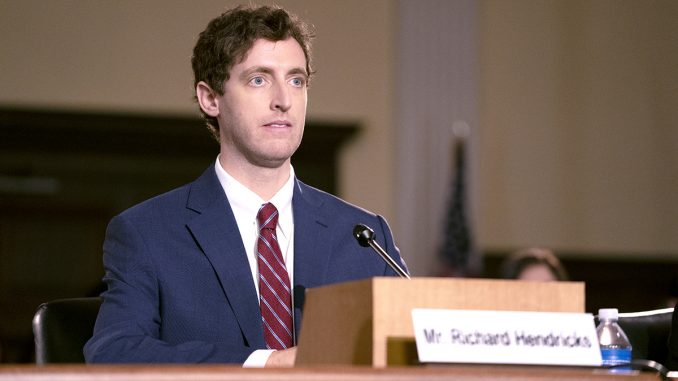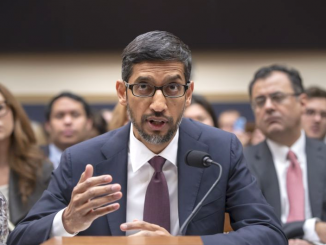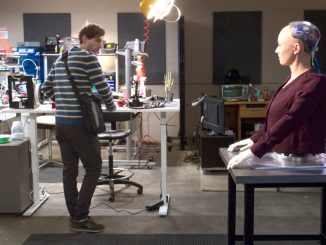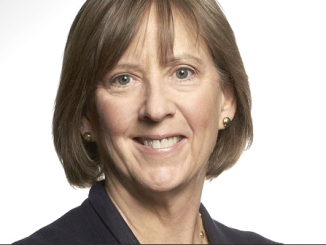
BY JAMIE MORROW
Daily Post Associate Editor
I guess you know you’ve made it in tech when you find yourself testifying before Congress.
When we last left HBO’s “Silicon Valley,” it seemed like the show’s scrappy startup and its founders had finally hit it big after spending so many agonizing seasons failing to find success with their breakthrough technology.
Of course, playing in the big leagues brings its own problems. As the first episode of the sixth and final season opened last night with Pied Piper founder Richard (Thomas Middleditch) preparing to speak before a Senate committee, it hit me again that show co-creators Mike Judge and Alec Berg are really going to take this satire of a Silicon Valley gold rush all the way.
If there’s anything that unites our current crop of tech overlords, from Mark Zuckerberg to Jeff Bezos to Larry Page and Sergei Brin, it seems to be a belief that if they trust their own intentions, we should, too. They don’t want to be evil. It’s just so hard to temper great power with great responsibility.
Well, yes. Yes, it is. Welcome to the world, where good intentions must be matched by good efforts. Where ethical considerations, if heeded, would hinder profit and possibility. Where you can sell out your users and say it’s for their own good, but no one has to believe you.
Internet for the people?
Richard loftily declares to Congress that his company won’t be like Facebook, Amazon, Google and the other tech behemoths who are so big they are nearly impossible to rein in. With Pied Piper, he said, there will be no surveillance. No exploiting people’s data for profit. He will provide a new, decentralized Internet for and by the people. “I will help you end this tyranny,” he announces.
The rest of the episode then makes it clear that “I will help you end this tyranny” is going to be “Don’t be evil” 2.0.
New Mountain View office
After his big speech, Richard returns in triumph to Pied Piper’s new, large Mountain View office to a big company party and a much bigger revelation. Colin (Neil Casey), a game developer whose massive multi-player online game runs with Richard’s technology, tells Richard that everything he just told Congress was false because Colin collects data constantly in order to optimize game-play. “I’m not using it to sell ads,” says Colin. And, to him, no biggie that Richard just lied to Congress.
“Maybe it’ll be like Google saying ‘Don’t be evil,’ or Facebook saying ‘I’m sorry, we’ll do better,’” Colin shrugs. Also, Colin doesn’t collect just machine data. His collection includes the raw audio files of whatever the gamers say into their headsets!
Aghast and furious, Richard orders him to stop, but Colin flat-out refuses. Richard wants to kick him off the platform but is reined in by the ever-practical Monica (Amanda Crew) because Colin’s gamers are keeping Pied Piper financially afloat.
‘Wrong in the service of rightness’
Meanwhile, it turns out Gilfoyle (Martin Starr) has been using the Pied Piper network to train an AI he wrote. One of the fruits of this effort is a Gilfoyle chatbot so good it more than passes the Turing test with Dinesh (Kumail Nanjiani), who unknowingly chats and laughs with it all day. The next thing you know, Richard has paired Gilfoyle’s AI with his own compression technology, trained it on all of Colin’s own recorded audio, and graphed and categorized a huge number of Colin’s sins in excruciating detail, from his sleeping with an investor’s wife to charging a jet-ski to investors to forgetting to text his mom. (The actual graph is hilarious.)
Jared (Zach Woods), who usually plays Jiminy Cricket for Richard, lets his need to be needed by Richard override his conscience. So he winds up endorsing Richard’s plan to use the dirt on Colin to extort him into stopping the data collection. “It’s wrong in the service of rightness,” they agree.
When Colin sees the graph and understands what went into making it, he’s floored. But not, as it turns out, by embarrassment.
A real-world company, Palo Alto’s Palantir, collects and synthesizes large amounts of data to find patterns and insights in them. Their clients range from JP Morgan and Airbus to the CIA and ICE. This is basically what Richard just did, and with incredible speed and thoroughness. The implied capabilities are stunning, and, as it turns out, not lost on Colin, who ends the episode showing the graph to his board of investors and crowing, “We’re all going to be (expletive) rich.” And crediting Richard, who looks on in horror. “It’s the greatest data-aggregating platform in history!”
It certainly opens up a lot of possibilities for a wild ride of a last season.
One of the underlying themes of the show has been that tech can be a wonderful sandbox where brilliant people really can create amazing things. But potentially world-changing creations may be at the service of people too petty, too greedy or too limited – maybe too human? – to deploy them responsibly.
As Gilfoyle says: “This is the cost of working with humans … They suck.”
Maybe our coming AI overlords will save us from ourselves.
Other notes:
• The show’s fictional tech giant Hooli had been slated to be acquired by Amazon, and on very good terms, but egomaniacal Hooli head Gavin (Matt Ross) scraps the deal at the last minute because Amazon wanted to completely drop the Hooli name. As a result, it seems Hooli will be much diminished.
• Colin rides into the office on a Lime electric scooter; he then chucks it into a trash bin. It’s an apt poke at Lime’s current troubles.
• San Jose Mayor Sam Liccardo has a completely gratuitous cameo.
• A super-annoying Pied Piper employee has pants that are also a wearable chair — when needed, legs come down so he can sit anywhere. This is somehow a real product.
• Sci-fi author Cory Doctorow and pro-net neutrality lawyer Marvin Ammori are some of the new names on the consultants list in the credits.
Email Jamie Morrow at [email protected]. Reviews of past episodes can be found here.



